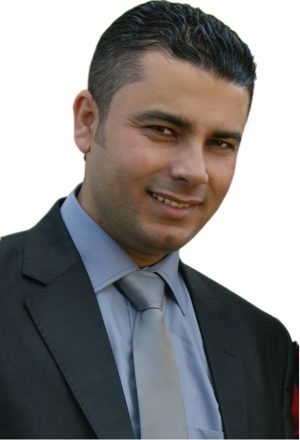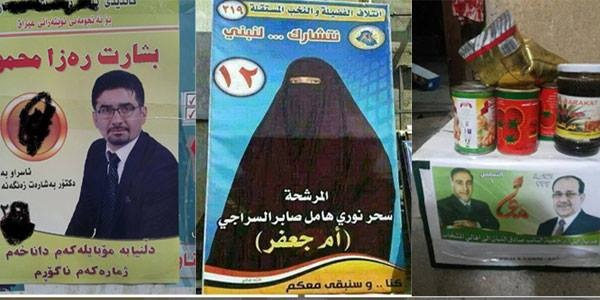
By Aras Ahmed Mhamad:
The election campaign for the Iraqi Parliamentary and Kurdistan region Provincial Elections started on April Fool’s Day, what an ideal date for the campaign!
Campaigning is a pillar in the process of voting, which automatically creates clashes and feuds especially as these days people have easy access to various types of technological tools.
Political prospects enlarge social confrontations, and sometimes endanger the wellbeing of the common person and question the legitimacy of the election campaign. The domination of party ideology in discussions and arguments will eventually deepen the circle of dispute and may lead to catastrophic consequences.
The existence of hundreds of uncensored or unverified pages on social media used as a toll for propaganda is part of the campaign that leads to the lifting of eyebrows which in turn leads to an inappropriate employment of defamatory and demeaning language.
Interfering in the private lives of the candidates, swearing and photo-shopping family members of the candidates to belittle them for political gain, have occurred unmercifully.
In the Kurdistan region in particular and Iraq in general, political parties started their campaigns on different days but with the same tools and in almost the same ways. Some have created fake accounts to disparage the candidates of other parties by attacking family members of the candidate. Others resort to image manipulation to make candidates look inferior.
Candidates go crazy to secure a seat. They use their names and photos on canned food and attach their electoral codes to prepared roast chicken when they give away gifts to underprivileged people.
That is a clear indication that people do not believe or are at least aware of having been manipulated by party officials’ promises in the previous elections of employment and better services, in terms of education and health care, that have clearly failed.
Political party officials who have an upper hand in governmental establishments participate in national, cultural and social events. High-ranking officials with their candidates take photos with ordinary citizens on the street and upload them onto social networks to show how close they are to people! What is ironic, a woman puts herself forward but voters do not have the chance to even see her face. Another candidate takes a photo with the head of a tribe to exploit his popularity. Yet another one says he campaigns by an order from God. Another candidate’s slogan is that he will not change his phone number. Another female candidate has one photo with her headscarf, another without so that her followers can hang them in two different cities. Another female candidate puts her brother’s photo on the poster instead of hers.
This is an obvious warning of the kind of mentality that rules Iraq and the Kurdistan region – plus it is an extreme exploitation of campaign time and misuse of public wealth and governmental posts and mismanagement of media to wrongly stimulate and captivate the audience.
Candidates obviously comprehend the message that only direct interaction could get them more votes to secure seats. Moreover, bribery and inducement is the talk of people in teahouses and in the street.
Hospitality and invitations and holding mass public events and preparing enormous meals are very common, especially in the countryside and by heads of tribes. Political parties in past elections used to give blankets and clothes to allure, engage, and generate interest among the voters.
Some candidates are graduates from college of agriculture, economy, medicine, computer and sport departments, but have written that they are political analysts apparently to appeal to the voters. Ironically, politicians are the least respected individuals among the citizens.
Others have high school certificates but introduce themselves on their official Facebook page and in newspaper interviews and on television as politicians. Ironically, so many candidates use the name of their tribes as surnames or prefixes to consolidate unconsciously the paradoxical attitude they hold in their character.
Others talk about heroic deeds and armed struggle while they were Peshmargas in the Kurdistan Mountains. Yet some others visit relatives of Anfal victims and disabled people to renew their fake promises.
Others try to stimulate religious sentiments and play with people’s emotions through posting photos of their pilgrimage trip.
Before the campaign started officially, Party media got election fever, which hastily exploded like a volcano. This mindless action sent the wrong message to the candidates to put their ads on social media platforms and heartened their followers to be wrongfully motivated.
The election campaign as a prerequisite for a democratic system is meant to serve the political system and bring about social justice, not slanderous language.
The significant thing about social media, however, is that it erases the remains of one party role or concentrates power in the hands of one leader or two, plus social media users generally push the fever to an extent of getting involved in disputes and arguments.
Election campaigns with candidate standing for representation is a two way process: it is an opportunity to get to know the real personality of the candidates and their projects and agendas; and a way of accepting each other, coexistence and respecting other people’s viewpoints.
Conversely and if in the wrong hands, the environment will be polluted through rowdily hanging flyers and posters in public places and on bridges or walls of hospitals and schools and using vulgar language and digitally altered of photos. The most disastrous threat is that some Party-oriented Facebook pages claim to have footage and images of naked female candidates and plan to upload them online, which is character terrorization.
The role of the media and media representation of the candidates is sensitive and voting is a basic right for self-determination. Voting is to legally choose someone to represent your voice.
Everyone lies but what is special about April 1st is that people admit they tell lies but eventually ask for an excuse because they told a white lie.
.jpg)



